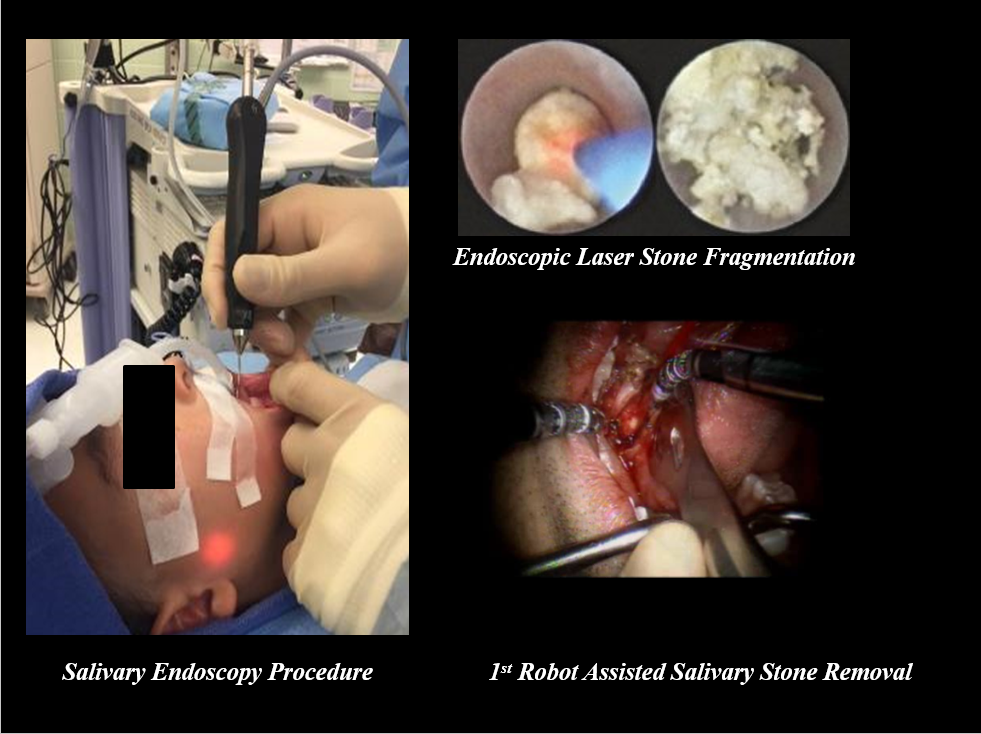Dean's Seminar Series
On December 9, 2020, Dr. Rohan Walvekar, Clinical Professor, Department of Otolaryngology Head & Neck Surgery presented for the School of Medicine Dean's seminar. The title of the presentation was “Salivary Endoscopy: A Paradigm Shift in the Management of Salivary Stones and Stenosis.” The presentation started with an orientation to the relevant surgical anatomy, physiology, and clinical symptomology related to obstructive and inflammatory salivary gland disease, namely sialolithiasis (salivary stones). This led to a discussion regarding the traditional management of salivary stones, which typically involves either gland sacrifice or evidence that justifies an approach for gland preservation. He then presented evidence to support the use of newer technologies using endoscopes and interventional tools; these procedures, termed “salivary endoscopy” or “sialendoscopy,” are used to manage salivary stones and stenosis, facilitate gland preservation, and promote faster patient recovery. Dr. Walvekar also noted that these surgeries were some of the first to be conducted in the United States and that the LSU Department of Otolaryngology is now being recognized as a Center of Excellence for these procedures.
Due to the limitations of the current technology and challenges posed by stone microstructure, Dr. Walvekar went on to discuss the various innovations that had emerged as a result of these pioneering surgeries. He also highlighted the invention of the Walvekar Salivary Stent for repair of the salivary ducts after sialendoscopy, and the fact that Drs. Walvekar and Daniel W. Nuss of LSU's Department of Otolaryngology were the first surgeons in the world to use robotic technology to treat salivary stones (see first robotic stone removal).
 Dr. Walvekar concluded the seminar by highlighting the most recent and exciting part
of the research being conducted by the Salivary Research Core Group at LSUHSC, which
aims to determine the ultrastructure of the stones. Understanding stone composition
may lead to better interventional tools and improve clinical outcomes. For these reasons,
Dr. Walvekar and his lead investigators, Drs. Carlos Busso and Jessie Guidry, conducted
an extensive proteomic analysis of stone microstructure and published their findings
in the journal of Clinical Proteomics (Busso et al, Clin Proteom 2020;17:12). This study identified 480 to 645 individual stone proteins that could be categorized as structural, enzymatic, and defensive proteins by function.
In addition, identification of proteins such as TAGLIN-2 (ID P37802-2) and AMBP (ID
P02760) within the stone matrix may warrant future research.
Dr. Walvekar concluded the seminar by highlighting the most recent and exciting part
of the research being conducted by the Salivary Research Core Group at LSUHSC, which
aims to determine the ultrastructure of the stones. Understanding stone composition
may lead to better interventional tools and improve clinical outcomes. For these reasons,
Dr. Walvekar and his lead investigators, Drs. Carlos Busso and Jessie Guidry, conducted
an extensive proteomic analysis of stone microstructure and published their findings
in the journal of Clinical Proteomics (Busso et al, Clin Proteom 2020;17:12). This study identified 480 to 645 individual stone proteins that could be categorized as structural, enzymatic, and defensive proteins by function.
In addition, identification of proteins such as TAGLIN-2 (ID P37802-2) and AMBP (ID
P02760) within the stone matrix may warrant future research.
For further information on the clinical management of salivary stones, patient appointments, or for information on the salivary stone research being conducted within the LSU Department of Otolaryngology Head & Neck Surgery, please contact Dr. Walvekar by calling 504-568-4785 or emailing Dr.Walvekar rwalve@lsuhsc.edu OR Carlos Busso, PhD cbusso@lsuhsc.edu.
The next Dean's Seminar will be held on Wednesday, March 10. Dr. Hari Koul, Interim Head of Biochemistry, will be the speaker. Check the website for specifics related to topic and learning objectives.
